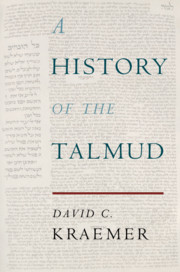Book contents
- A History of the Talmud
- A History of the Talmud
- Copyright page
- Contents
- Preface
- Glossary
- Timeline
- Chapter 1 Introduction
- Chapter 2 Before the Rabbis
- Chapter 3 The Emergence of the Mishnah
- Chapter 4 What Is the Mishnah?
- Chapter 5 The Reception of the Mishnah
- Chapter 6 The First Talmud
- Chapter 7 Jews in Babylonia and the Emergence of the Babylonian Talmud (the Bavli)
- Chapter 8 What Is the Bavli?
- Chapter 9 The Reception of the Bavli
- Chapter 10 The Talmud in Early Modernity
- Chapter 11 The Talmud in Modernity and Beyond
- References
- Index
Chapter 3 - The Emergence of the Mishnah
Published online by Cambridge University Press: 18 July 2019
- A History of the Talmud
- A History of the Talmud
- Copyright page
- Contents
- Preface
- Glossary
- Timeline
- Chapter 1 Introduction
- Chapter 2 Before the Rabbis
- Chapter 3 The Emergence of the Mishnah
- Chapter 4 What Is the Mishnah?
- Chapter 5 The Reception of the Mishnah
- Chapter 6 The First Talmud
- Chapter 7 Jews in Babylonia and the Emergence of the Babylonian Talmud (the Bavli)
- Chapter 8 What Is the Bavli?
- Chapter 9 The Reception of the Bavli
- Chapter 10 The Talmud in Early Modernity
- Chapter 11 The Talmud in Modernity and Beyond
- References
- Index
Summary
The first major rabbinic composition – the Mishnah, which would ultimately form the foundation and shank of both of the Talmudim – emerged in an age of great upheaval for Jews. Losing two wars with the Romans, seeing their magnificent Temple in Jerusalem rendered rubble, Jews cannot long have held onto the hope that the world they had known would quickly be rebuilt. Had God abandoned them? – many must have wondered. If not, then how, in the absence of the Temple, could their relationship with God be maintained? Were its functions to be replaced? How were other Jewish institutions, practices, and holy days, many of which were deeply tied to the Temple, to be shaped for the new world? Against this background, and in response to the conditions just described, a new religious fellowship – the rabbi – began to forge new approaches and teachings, going a long way toward redefining Judaism for the post-Temple era. In this chapter, we will consider the early history of Jews under Roman rule in Palestine, which served as the stage for the development of the rabbis and their writings.
Keywords
- Type
- Chapter
- Information
- A History of the Talmud , pp. 36 - 57Publisher: Cambridge University PressPrint publication year: 2019

